#Gay Spousal Military Benefits
Text
youtube
something about this video is giving hauntology - between the one guy with the pride flag and hillary clinton not actually doing the macarena and just clapping and for a split second making a really wild face

postscript HIGH EFFORT edit (i.e., hold the fucking phone)
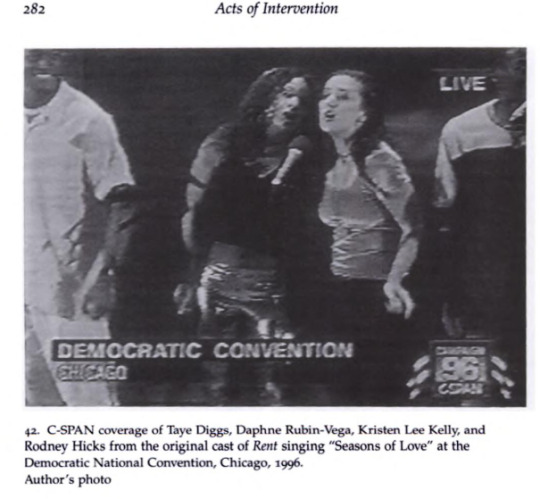
"Consider that the cast of Rent performed at the opening night of the 1996 Democratic National Convention in Chicago (fig. 42). The idea that a song from an AIDS performance has now become linked with the very political systems that AIDS performance has historically set out to confront is not without its irony. Certainly, the contradiction [hell yeah] between the inclusion of Rent within the spectacle of presidential politics and the political reality of the people which Rent [in 1998 Rent was still, fairly, considered radical, we as readers in 202X must remember this] represents is unavoidable. Rent's performance at the convention is a vivid reminder of how AIDS performance can be absorbed and redefined by other, more powerful systems who use [SIC BITCH] it to serve their own interests, whether that interest is denying voice and visibility to the communities represented in Rent (no person with AIDS addressed the delegates during the prime-time televised convention programming) or whether the interest is in benignly entertaining the convention delegates with a musical number from a popular Broadway show. [author goes on to say some incredibly 1998 shit about "a more participatory political process" but it actually leads into a more interesting read of Rent but that's boring.]"
Acts of Intervention: Performance, Gay Culture, and AIDS
Pages 281-282
David Roman [YOU THINK I CARE ABOUT A PROPER CITATION?]
see? I told you there was hauntology present
POST POST SCRIPT EDIT (BUT WAIT THERE'S MORE)
you were stabbed in the back flag man

AUGUST
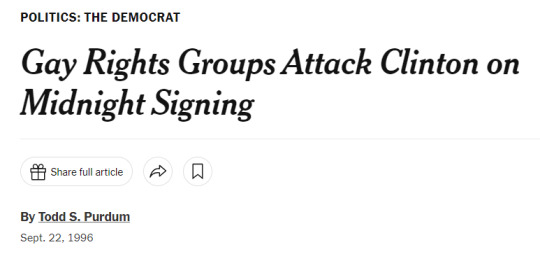
SEPTEMBER
"Gay rights advocates today denounced President Clinton's midnight signing of a bill to deny Federal recognition and benefits to couples of the same sex who might marry, dismissing it as a ''historical misjudgment'' that endorsed a ''needless and mean-spirited bill.''
Such criticism came as no surprise and was exactly in line with the reaction Mr. Clinton expected when he announced in May that he would sign the bill to avoid a political firestorm on an issue he did not support in the first place.
The President's spokesman, Michael D. McCurry, acknowledged that Mr. Clinton had signed the bill because ''the President believes the motives behind this bill are dubious and the President believes that the sooner he gets this over with the better.''
No state allows same-sex marriage, but a court case is pending over efforts to permit it in Hawaii. Mr. Clinton has long supported gay rights but has also long opposed same-sex marriage, and he said in the spring that he would sign a bill defining marriage as the union of one man and one woman and allowing states to ignore same-sex marriages sanctioned by other states.
Some civil rights advocates had urged the President to veto the bill on the constitutional ground that it would weaken the ''full faith and credit'' clause requiring states to honor regulations of other states. But Mr. Clinton, who paid a heavy political price for his early, unsuccessful effort to allow homosexuals to serve openly in the military, was eager to prove himself a social moderate unwilling to pick a fight over such a sensitive issue.
''President Clinton has become the first President in history to trample on states' traditional jurisdiction over marriage,'' said Elizabeth Birch, executive director of the Human Rights Campaign, a gay rights group. ''With the stroke of his pen, he has condoned the exclusion of all lesbian and gay Americans from the Federal benefits and responsibilities that come with marriage, even though it will be years before such an institution becomes available to them.''
The law will not ban such marriages, but will deny recognition of them, for example by precluding spousal benefits distributed by Government programs like Social Security and veterans services.
Mr. Clinton signed the bill without ceremony in the wee hours this morning, after returning from a four-day campaign trip.
The White House has made clear its discomfort with the bill, in part because some of its supporters used antihomosexual language that Mr. Clinton was not eager to be seen as tolerating, much less endorsing.
And though the President has often been happy to endure criticism from the left because it makes him appear more moderate, he did not want a messy election-year fight with gay rights advocates who have been among his strongest supporters, so the White House has soft-pedaled the issue at every turn.
By contrast, Mr. Clinton went out of his way in his weekly radio address to the nation this morning to highlight a more mainstream, old-fashioned concept of family. He repeated his support for allowing mothers and newborn children at least 48-hour hospital stays, instead of the 24-hour limit insurance companies generally impose, and praised Congressional leaders for agreeing this week to pass such a provision.
''Parents deserve at least two days of care and comfort when they can hold their child, bond with the child, introduce the child to the world and make sure their child is in the very best of health,'' Mr. Clinton said. ''America has a responsibility to protect the health of our families.''
Mr. Clinton also praised the leadership of the Republican-controlled Congress for agreeing to require insurance companies to offer comparable benefits for mental and physical illnesses, one of his Administration's longtime goals.
Mr. Clinton used both the gay marriage issue and the motherhood questions he addressed today to portray himself as the architect of reasonable compromise on such questions.
He said that since he vetoed the Republicans' budget-cutting plans last year, they have sat up and listened more carefully. It is one of the principal themes of his re-election campaign, and one that public opinion surveys show has been working.
''This week's agreement shows what we can accomplish when we set aside rigid agendas, put aside partisanship and work together,'' Mr. Clinton said. ''Just a year ago, Congress was consumed by bitter partisanship as the Republican majority sought deep cuts in Medicare and Medicaid, education and the environment that were unnecessary to balance the budget.
''I vetoed their plan, and the American people supported my decision. So this year, in clear contrast, we are getting things done.'' "
[yeah I know it marks me as old for giving a shit about Clinton but how quickly we forget that this man was the BLUEPRINT AND ARCHITECT for liberal "reasonable compromise" and the respect for state's rights loser liberal bullshit that is one of the main reasons for anti-trans legislation today]
[yes I'm aware that this jumps from just being okay with gay people to AIDS to gay marriage legal/financial benefits to trans rights and isn't a coherent chain of points but that's how the world works okay? "beyond the scope of this essay" bullshit. I'm going to write the way that I wanted to write every undergraduate essay before I had to inevitably pare it down to come across as sane]
1 note
·
View note
Photo
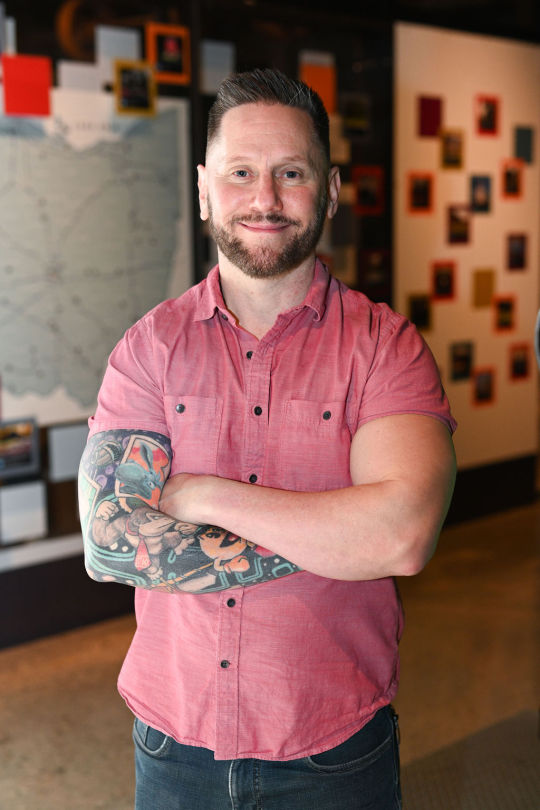
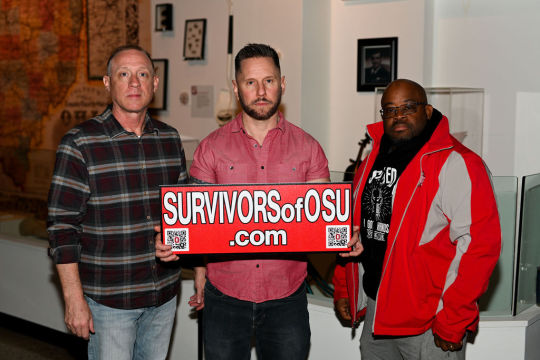
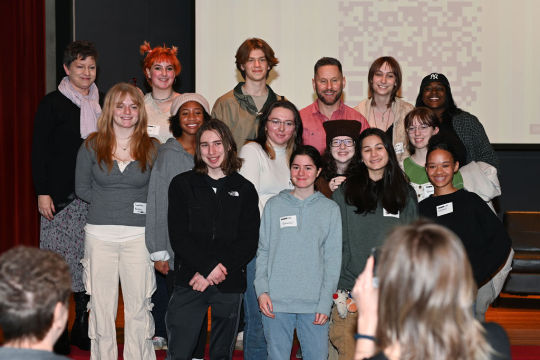
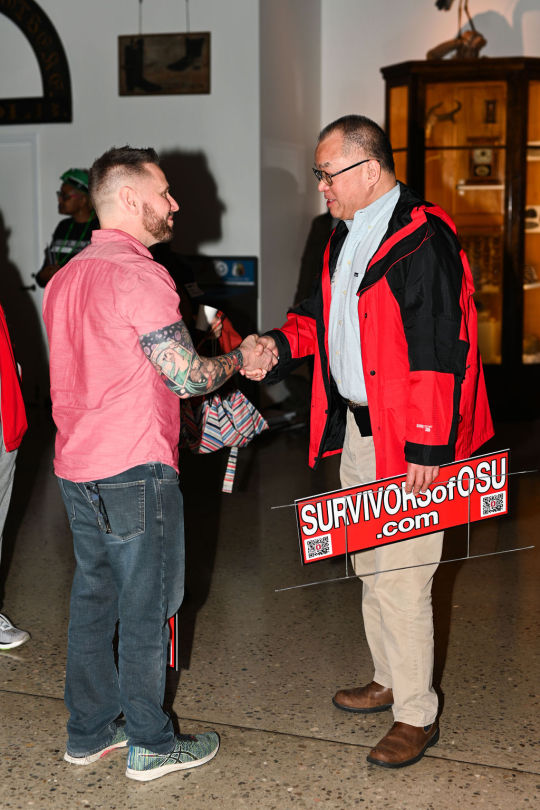
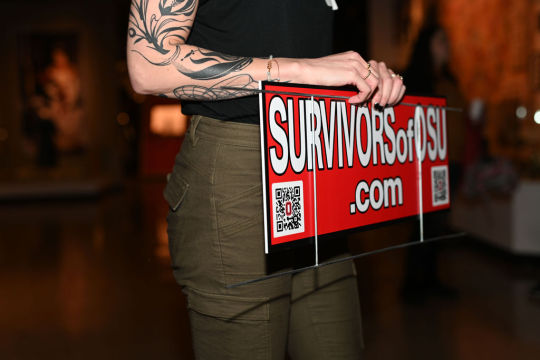
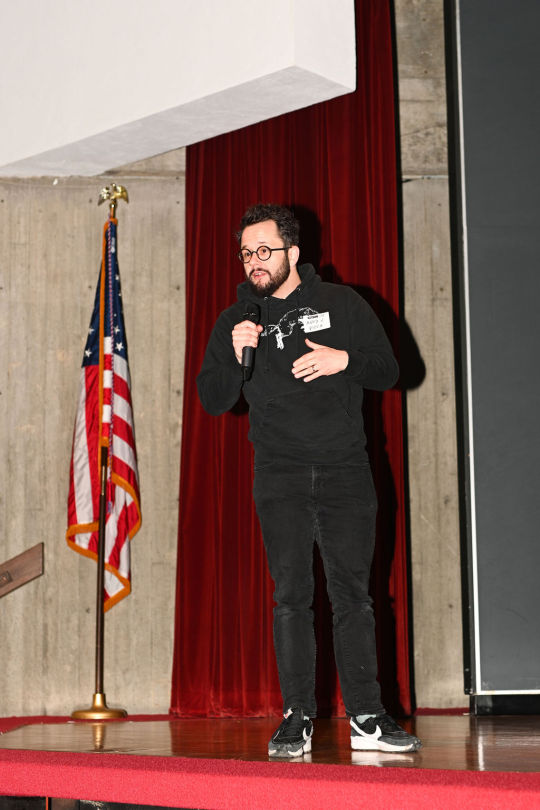
MARCH EVENT PHOTOS
March’s global theme: Corruption
Columbus speaker: Stephen Snyder-Hill
When "Don't Ask, Don't Tell;' the official U.S. policy on gays serving in the military, was repealed in September 2011, soldier Stephen Snyder-Hill (then Captain Hill) was serving in Iraq. Having endured years of this policy, which passively encouraged a culture of fear and secrecy for gay soldiers, Snyder-Hill submitted a video to a Republican primary debate held two days after the repeal. In the video, he asked for the Republicans' thoughts regarding the repeal and their plans, if any to extend spousal benefits to legally married gay and lesbian soldiers.
His video was booed by the audience on national television.
Stephen wrote the book: Soldier of Change: From the Closet to the Forefront of the Gay Rights Movement. Snyder- Hill and has traveled the country with his husband, giving interviews on major news networks and speaking at universities, community centers, and pride parades, a champion of LGBT equality.
In 2015 The Ohio State University asked Steve Snyder-Hill, an activist and author to come and be the main headliner for their TedX event. His speech on the theme of the Human Narrative was powerful and his talk was titled Trust the Power of Your Voice. OSU celebrated the use of his voice to evoke change...until they realized that he was one of the hundreds of students who were sexually abused at the hands of Richard Strauss, their employee. Once Steve made this connection and realized OSU was trying to silence him, he stayed true to his spirit and used the power of his voice, this time to fight them.
Steve's incredible story as a survivor of sexual assault and advocate for truth is being made into a documentary for HBO, produced by George Clooney’s production company.
We’re honored he’ll be sharing this story with us, first.
Stephen Snyder-Hill joined the military in 1988 and was deployed in 1990 for Operation Desert Storm. He went into the US Army reserves and was redeployed twenty years later in 2010 for Operation New Dawn. Throughout his military career Snyder-Hill received numerous awards and decorations, including the Meritorious Service Medal.
Steve eventually earned a Master’s Degree in Dietetics, and minored in Exercise Physiology at The Ohio State University. He retired in 2019 as a Major in the US Army Reserve and works as a Dietitian at Columbus Public Health in Columbus, Ohio.
See more photos here: https://flic.kr/s/aHBqjAws9P
0 notes
Text
Equality for LGBTQ+ Veterans
Week 10 Blog: LGBTQ+ and the Military
Megan Carter
Psychology and Social Change
Dr. Diaz-Lazaro
Walden University
May 2, 2022
The Social Change Issue: An Introduction
Historically, the Unites States military has not been accepting nor offered equal treatment to individuals outside of the heterosexual population. Military men and women who identified within the LGBTQ+ community were pressured to keep silent and not make their sexual preferences known (VA expands “PRIDE In All Who Served” program for LGBTQ+ Veterans, 2021). Civilian society has begun social change in encouraging LGBTQ+ individuals to be proud of who they are; society has been evolving in the area of social change as an attempt at a universal acceptance of these individuals has continued to grow. The United States military has begun to accept and encourage indivduals in the LGBTQ+ community to be open about their sexuality; the Veterans Administration Medical Centers have also begun to offer all mental health and medical services to veterans of the LGBTQ+ community. The VAMC offers a special clinic specifically for these individuals to get the best care possible while being mindful and accepting of their individual needs (Puntasecca et al., 2019).
Description of the Social Change Issue
Since WWII, gay and lesbian military personnel have faced tremendous discrimination and backlash from the military. During this time, individuals trying to enlist were asked their sexuality. Since at the time, homosexuality was not accepted by the military, individuals who answered “yes” to being homosexual were instructed to answer questions vaguely and even lie about their sexuality. Openly gay or lesbian individuals were increasingly teased, discriminated, and mistreated while serving (Coming Out Under Fire: The Story of Gay and Lesbian Service Members, 2020). Since 2011, openly gay, lesbian and bisexual men and women have been permitted to serve in the military. Acceptance for LGBTQ in the military expanded with the lifting of the transgender ban in 2021. It wasn’t until 1982 that the military enacted a policy explicitly banning gay men and lesbians from their ranks. Before that, however, same-sex relations were criminalized and cause for discharge. And in the early 1940s, it was classified as a mental illness, disqualifying gay men and lesbians from service. In 1993, the “don’t ask, don’t tell” policy went into effect allowing closeted LGBTQ people to serve in the military. Under the policy, service members would not be asked about their sexual orientation but would be discharged for disclosing it. Eighteen years later, Congress repealed the policy, allowing openly gay, lesbian and bisexual people to serve in the military. Another barrier was lifted in 2013 when spousal and family benefits were extended to same- sex married partners in the military. After ending temporarily in 2016, the ban on transgender individuals was again rescinded in 2021, allowing those who don’t identify with their biological gender to enlist and serve in the armed forces. Given the military’s 245-year history, its policy to accept LGBTQ service members into its ranks is still relatively new. Cultural changes take time; stigma against LGBTQ service members may linger. This can be a barrier to living openly as an LGBTQ person in the military (Meade, 2021). The Veteran’s Administration Medical Centers across the United States began confidential treatment of veterans who were part of the LGBTQ+ community in July of 2019. The VAMC allows for more applicable medical and mental health treatment for those in the LGBTQ+ community through specialized clinics for those individuals. There is a slowly growing acceptance in the military community for individuals of the LGBTQ+ community; however, the group is still considered a minority group and continues to receive significant pushback, prejudices, and discriminatory treatment. There is much room for growth and improvement for social change in this situation (Hilgeman et al., 2022).
The Role Psychologists Play in the Legal Process
Psychologists play many roles in the legal system; psychologists evaluate the success of various legal interventions or reforms. A large and growing number of local districts use drug courts as an alternative to traditional criminal courts to help defendants receive addiction-treatment counseling and intensive supervision instead of incarceration. Of course, lawmakers wonder whether drug courts, with their emphasis on treatment and supervision, work better than incarceration. Psychologists have evaluated the effectiveness of drug courts and concluded that they do not eliminate recidivism but that defendants who work with drug courts are less likely to be arrested for later drug violations than are defendants sentenced in the traditional criminal legal system. Psychologists also assist the court by making evaluations of defendants to determine competency to stand trial. Similarly, psychologists may provide expert opinions regarding an individual's competency to be a witness. In civil cases, the psychologist may render an opinion concerning a person's capacity to manage business, financial, and property affairs. In domestic relations cases, psychologists may appear as witnesses for clients seeking child custody. In addition, psychologists who have worked as vocational counselors are uniquely qualified to serve as expert witnesses in personal injury cases. In many court clinics, psychologists conduct presentence evaluations and make appropriate recommendations to court regarding case disposition (U.S. Department of Social Justice: Office of Justice Programs, 2022).
Evaluation on Social Change Movements
Many social change movements have had a positive effect on crime rates. Movements to increase safety of those involved in the criminal process, such as forensic psychologists, policeman, and employees of the courts as well as increases in safe housing for individuals in high- crime areas have shown a significant decrease in crime rates and the harmful effects of those involved. The Justice Reform Movement of 2020 showed significant results in positively affecting crime rates. New Mexico, Austin, Texas, Minneapolis, San Francisco, and Seattle are cities who have increased safety protocol via social change movements to decrease crime rates since August 2020. Additionally, movements promoting police accountability have shown a 90% decrease in crime rates within the mentioned cities on individuals by policemen (U.S. Department of Social Justice: Office of Justice Programs, 2022).
LGBTQ+ Veterans and Legal Processes for Change
One legal action that could be taken to further a change in equality for the LGBTQ+ community is to provide same- sex marriage benefits to veterans as those in heterosexual marriages. Movements to accomplish this have already begun. On June 26, 2015, the Supreme Court held in Obergefell v. Hodges that the Fourteenth Amendment of the U.S. Constitution requires a state to license a marriage between two people of the same sex and to recognize a marriage between two people of the same sex when their marriage was lawfully licensed and performed out-of-state. Accordingly, the Department of Veterans Affairs (VA) may now recognize all same-sex marriages without regard to a Veteran’s state of residence (Important Information on Marriage , 2015).
Why This Topic?
This topic has been a topic of high interest to me the past few years. I have always had a passion for working with military veterans, and all of my research for my Master’s degree and PhD have been grounded in military psychology. The topic of the LGBTQ+ community becoming a socially changed area of acceptance in the military community caught my interest as it is a newer social change movement and only recently truly accepted by the United States Department of Veterans Affairs. A program called “Pride in All Who Served” is a program offered by the VAMC. PRIDE is a 10-week health education program focused on reducing health care disparities among Lesbian, Gay, Bisexual, Transgender and Queer Veterans. All VAMC hospitals now have an LGBTQ+ Veteran Care Coordinator onsite to assist LGBTQ+ Veterans accessing VA services available to them (VA expands “PRIDE In All Who Served” program for LGBTQ+ Veterans, 2021).
References
5 Discussions that Shaped the Justice Reform Movment in 2020. (2021, March 18). Retrieved from American Progress: https://www.americanprogress.org/article/5-discussions-shaped-justice-reform-movement-2020/
Hilgeman, M. M., Lange, T. M., Bishop, T., & Cramer, R. J. (2022). Spreading pride in all who
served: A health education program to improve access and mental health outcomes for
sexual and gender minority veterans. Psychological Services.
Important Information on Marriage . (2015, December 10). Retrieved from U.S. Department of Veterans Affairs: https://www.va.gov/opa/marriage/
Meade, V. (2021). Patriotism as a Construct for Understanding Military Service Among
LGBTQ+ Veterans: A Call for Research Grounded in Institutional Oppression. Journal
of Veterans Studies, 7(3).
Puntasecca, C., Hall, E. A., & Ware, J. (2019). Serving All Who Served: An Analysis of the
VA's Visual and Digital Rhetorics for Welcoming Sexual and Gender Minority Veterans
Into VA Care. World Medical & Health Policy, 11(4), 440-463.
U.S. Department of Social Justice: Office of Justice Programs. (2022). Retrieved from Psychologist as Consultant to the Court: https://www.ojp.gov/ncjrs/virtual-library/abstracts/psychologist-consultant-court
VA expands “PRIDE In All Who Served” program for LGBTQ+ Veterans. (2021, July 29). Retrieved from U.S. Department of Veterans Affairs: https://www.va.gov/opa/pressrel/pressrelease.cfm?id=5688
1 note
·
View note
Text
"Today, most people see same-sex marriage as an ethical debate about the right to publicly express one's love for whomever they choose. In fact, it is an ongoing struggle for access to social privileges. While the same-sex marriage movement has a long history, its current visibility is largely the result of HIV/AIDS activism in the US during the '90s. Accepting the cultural impossibility of socialized health care, energies were desperately redirected to spousal rights as a stopgap solution for quickly expanding the number of insured gay men. In addition to spousal health coverage, legal recognition of same-sex marriages would grant partners family visiting rights in hospitals, the ability to make health care decisions when a partner is incapacitated, the right to remain living in an apartment leased under a partner's name after their death, shared child custody rights, and a wide variety of other privileges.
However, selling a homophobic public at large on each of these varied social issues would be far more difficult than simply repackaging the debate as an ethical right to marry. And that is largely how the argument remains framed today. So much so that even most queers are unaware of the broader histories and issues in play. These days, supporting same-sex marriage just seems like the liberal thing to do. The fair thing to do. Common sense. Meanwhile, what I would argue to be a more compassionate and ethical "sense" to dismantle those exclusionary matrimonial institutions altogether is further rendered uncommon.
It is important to remember that a key function of social services is the increased ability for people to exist outside of familial dependence. Such services emerged in no small part from the struggles of women, queers and gender-others to exist despite disownment or detachment from their families. Obtaining basic independence may not seem like a big deal to a certain privileged section of contemporary first-worlders, but historically speaking it is something new, extremely radical, and still largely unthinkable in much of the world. Therefore, much as "disco sucks" campaigns masked broader cultural sentiments of racism and homophobia, so do today's commonplace rants against the "welfare state" mask sentiments against diversity, women's independence, the ability to exist as something other than a male dependent, and the poverty experienced by socially ostracized gender and sexual outcasts.
In specific relation to gender and sexual outcasts, how do cultures go about convincing us to go along with rollbacks in already insufficient social services? The simplest option is to invite us black sheep of heteronormativity to return to our clans. Homecomings that involve officializing and re-regulating our legal relationships to those clans. Liberal humanist cultures are recognizing they do not need to demand our heterosexuality. They only require our heteronormativity. This is what underlies today's mainstream "queer moment." Business culture understands most of all that sexual orientation doesn't matter, so long as the collective goals of private wealth, full-time labor, credit-debt, mortgaged home ownership, family, and military service are publicly upheld.
For many of us the promise of finally being allowed to partake in the American Dream sounds like the deal of the century. After all, we grew up internalizing the same bullshit aspirations as the next person, and despite persistent myths of our innate creativity, we have just as little imagination as everyone else. As Amy Gluckman and Betsy Reed had already observed in the mid-'90s, whereas the Queer Nation slogan, "we're here, we're queer, get used to it," once promised to stretch straight peoples' concepts of morality, family and politics, queers who reaped the benefits of corporate acceptance have been quick to promise the world, "we're here, we're just like you, don't worry about it."
Our own desperate stopgap plan to create and exploit a loophole of same-sex marriage has been ideologically co-opted, flipped and sold back to us as an all-around solution for queer fulfillment. Whereas just a few short decades ago we primarily fought for our decriminalization—a project that is by all means far from even begun—we are now more likely to demand our legal re-regulation. We demand it as a human right, as opposed to recognizing it as human bondage. We organize around it far more than any demolition of the tyrannical family systems that have crushed us for centuries. In the end, a murderously abusive father's patriarchal love is apparently more valuable than one's autonomy from such a monster. More valuable than love found elsewhere, or love of self. So much for our PrideTM."
- Terre Thaemlitz
12 notes
·
View notes
Text
A HISTORY OF THE US GAY RIGHTS MOVEMENT
The American Gay Rights Movement: A Timeline This timeline provides information about the gay rights movement in the United States from 1924 to the present: including the Stonewall riots; the contributions of Harvey Milk; the "Don't Ask, Don't Tell" policy; the first civil unions; the legalization of same-sex marriage in Massachusetts, Connecticut, New York; and more. 1924 The Society for Human Rights in Chicago becomes the country's earliest known gay rights organization. 1948 Alfred Kinsey publishes Sexual Behavior in the Human Male, revealing to the public that homosexuality is far more widespread than was commonly believed. 1951 The Mattachine Society, the first national gay rights organization, is formed by Harry Hay, considered by many to be the founder of the gay rights movement. 1955 The first lesbian-rights organization in the United States, the Daughters of Bilitis, was established in San Francisco in 1955. 1956 The Daughters of Bilitis, a pioneering national lesbian organization, is founded. 1958 Joe Cino, an Italian-American theater producer, opens Caffe Cino. Caffe Cino is credited with starting the Off-Off-Broadway theater movement. Six years after Caffe Cino opens, it hosts the first gay plays, The Madness of Lady Bright, by Lanford Wilson, and The Haunted Host, by Robert Patrick. 1962 Illinois becomes the first state in the U.S. to decriminalize homosexual acts between consenting adults in private. 1966 The world's first the transgender organization, the National Transsexual Counseling Unit, was established in San Francisco. 1969 The Stonewall riots transform the gay rights movement from one limited to a small number of activists into a widespread protest for equal rights and acceptance. Patrons of a gay bar in New York's Greenwich Village, the Stonewall Inn, fight back during a police raid on June 27, sparking three days of riots. 1973 The American Psychiatric Association removes homosexuality from its official list of mental disorders. Harvey Milk runs for city supervisor in San Francisco. He runs on a socially liberal platform and opposes government involvement in personal sexual matters. Milk comes in 10th out of 32 candidates, earning 16,900 votes, winning the Castro District and other liberal neighborhoods. He receives a lot of media attention for his passionate speeches, brave political stance, and media skills. 1976 San Francisco Mayor George Moscone appoints Harvey Milk to the Board of Permit Appeals, making Milk the first openly gay city commissioner in the United States. Milk decides to run for the California State Assembly and Moscone is forced to fire him from the Board of Permit Appeals after just five weeks. Milk loses the State Assembly race by fewer than 4,000 votes. Believing the Alice B. Toklas LGBT Democratic Club will never support him politically, Milk co-founds the San Francisco Gay Democratic Club after his election loss. 1977 Activists in Miami, Florida pass a civil rights ordinance making sexual orientation discrimination illegal in Dade County. Save Our Children, a campaign by a Christian fundamentalist group and headed by singer Anita Bryant, is launched in response to the ordinance. In the largest special election of any in Dade County history, 70% vote to overturn the ordinance. It is a crushing defeat for gay activists. 1978 On January 8, Harvey Milk makes national news when he is sworn in as a member of the San Francisco Board of Supervisors. Running against 16 other candidates, he wins the election by 30 percent. Milk begins his term by sponsoring a civil rights bill that outlaws sexual orientation discrimination. Only one supervisor votes against it and Mayor Moscone signs it into law. John Briggs drops out of the California governor's race, but receives support for Proposition 6, also known as the Briggs Initiative, a proposal to fire any teacher or school employee who publicly supports gay rights. Harvey Milk campaigns against the bill and attends every event hosted by Briggs. In the summer, attendance greatly increases at Gay Pride marches in San Francisco and Los Angeles, partly in response to Briggs. President Jimmy Carter, former Governor Ronald Reagan, and Governor Jerry Brown speak out against the proposition. On November 7, voters reject the proposition by more than a million votes. On November 27, Harvey Milk and Mayor George Moscone are assassinated by Dan White, another San Francisco city supervisor, who had recently resigned and wanted his job back, but was being passed over because he wasn't the best fit for the liberal leaning Board of Supervisors and the ethnic diversity in White's district. San Francisco pays tribute to Harvey Milk by naming several locations after him, included Harvey Milk Plaza at the intersection of Market and Castro streets. The San Francisco Gay Democratic Club changes its name to the Harvey Milk Memorial Gay Democratic Club. 1979 About 75,000 people participated in the National March on Washington for Lesbian and Gay Rights in Washington, D.C., in October. It was the largest political gathering in support of LGBT rights to date. 1980 At the 1980 Democratic National Convention held at New York City's Madison Square Garden, Democrats took a stance supporting gay rights, adding the following to their plank: "All groups must be protected from discrimination based on race, color, religion, national origin, language, age, sex or sexual orientation." 1982 Wisconsin becomes the first state to outlaw discrimination on the basis of sexual orientation. 1984 The city of Berkeley, California, becomes the first city to offer its employees domestic-partnership benefits. 1993 The “Don't Ask, Don't Tell” policy is instituted for the U.S. military, permitting gays to serve in the military but banning homosexual activity. President Clinton's original intention to revoke the prohibition against gays in the military was met with stiff opposition; this compromise, which has led to the discharge of thousands of men and women in the armed forces, was the result. On April 25, an estimated 800,000 to one million people participate in the March on Washington for Lesbian, Gay, and Bi Equal Rights and Liberation. Several events such as art and history exhibits, public service outings and workshops are held throughout Washington, DC leading up the event. Jesse Jackson, RuPaul, Martina Navratilova, and Eartha Kitt are among the speakers and performers at a rally after the march. The march is a response to “Don't Ask Don't Tell”, Amendment 2 in Colorado, as well as rising hate crimes and ongoing discrimination against the LGBT community. 1996 In Romer v. Evans, the Supreme Court strikes down Colorado's Amendment 2, which denied gays and lesbians protections against discrimination, calling them “special rights.” According to Justice Anthony Kennedy, “We find nothing special in the protections Amendment 2 withholds. These protections . . . constitute ordinary civil life in a free society.” 2000 Vermont becomes the first state in the country to legally recognize civil unions between gay or lesbian couples. The law states that these “couples would be entitled to the same benefits, privileges, and responsibilities as spouses.” It stops short of referring to same-sex unions as marriage, which the state defines as heterosexual. 2003 The U.S. Supreme Court rules in Lawrence v. Texas that sodomy laws in the U.S. are unconstitutional. Justice Anthony Kennedy wrote, “Liberty presumes an autonomy of self that includes freedom of thought, belief, expression, and certain intimate conduct.” In November, the Massachusetts Supreme Judicial Court ruled that barring gays and lesbians from marrying violates the state constitution. The Massachusetts Chief Justice concluded that to “deny the protections, benefits, and obligations conferred by civil marriage” to gay couples was unconstitutional because it denied “the dignity and equality of all individuals” and made them “second-class citizens.” Strong opposition followed the ruling. 2004 On May 17, same-sex marriages become legal in Massachusetts. 2005 Civil unions become legal in Connecticut in October. 2006 Civil unions become legal in New Jersey in December. 2007 In November, the House of Representatives approves a bill ensuring equal rights in the workplace for gay men, lesbians, and bisexuals. 2008 In February, a New York State appeals court unanimously votes that valid same-sex marriages performed in other states must be recognized by employers in New York, granting same-sex couples the same rights as other couples. In February, the state of Oregon passes a law that allows same-sex couples to register as domestic partners allowing them some spousal rights of married couples. On May 15, the California Supreme Court rules that same-sex couples have a constitutional right to marry. By November 3rd, more than 18,000 same-sex couples have married. On November 4, California voters approved a ban on same-sex marriage called Proposition 8. The attorney general of California, Jerry Brown, asked the state's Supreme Court to review the constitutionality of Proposition 8. The ban throws into question the validity of the more than 18,000 marriages already performed, but Attorney General Brown reiterated in a news release that he believed the same-sex marriages performed in California before November 4 should remain valid, and the California Supreme Court, which upheld the ban in May 2009, agreed, allowing those couples married under the old law to remain that way. November 4, voters in California, Arizona, and Florida approved the passage of measures that ban same-sex marriage. Arkansas passed a measure intended to bar gay men and lesbians from adopting children. On October 10, the Supreme Court of Connecticut rules that same-sex couples have the right to marry. This makes Connecticut the second state, after Massachusetts, to legalize civil marriage for same-sex couples. The court rules that the state cannot deny gay and lesbian couples the freedom to marry under Connecticut's constitution, and that the state's civil union law does not provide same-sex couples with the same rights as heterosexual couples. On November 12, same-sex marriages begin to be officially performed in Connecticut. 2009 On April 3, the Iowa Supreme Court unanimously rejects the state law banning same-sex marriage. Twenty-one days later, county recorders are required to issue marriage licenses to same-sex couples. On April 7, the Vermont Legislature votes to override Gov. Jim Douglas's veto of a bill allowing gays and lesbians to marry, legalizing same-sex marriage. It is the first state to legalize gay marriage through the legislature; the courts of the other states in which the marriage is legal—Massachusetts, Connecticut, and Iowa—gave approval. On May 6, the governor of Maine legalized same-sex marriage in that state in Maine; however, citizens voted to overturn that law when they went to the polls in November, and Maine became the 31st state to ban the practice. On June 3, New Hampshire governor John Lynch signs legislation allowing same-sex marriage. The law stipulates that religious organizations and their employees will not be required to participate in the ceremonies. New Hampshire is the sixth state in the nation to allow same-sex marriage. On June 17, President Obama signs a referendum allowing the same-sex partners of federal employees to receive benefits. They will not be allowed full health coverage, however. This is Obama's first major initiative in his campaign promise to improve gay rights. On August 12, President Obama posthumously awards Harvey Milk the Presidential Medal of Freedom. 2010 March 3, Congress approves a law signed in December 2009 that legalizes same-sex marriage in the District of Columbia. August 4, Chief U.S. District Judge Vaughn Walker rules that Proposition 8, the 2008 referendum that banned same-sex marriage in California, violates the 14th Amendment's equal protection clause. "Proposition 8 singles out gays and lesbians and legitimates their unequal treatment," Vaughn writes. "Proposition 8 perpetuates the stereotype that gays and lesbians are incapable of forming long-term loving relationships and that gays and lesbians are not good parents." December 18, the U.S. Senate votes 65 to 31 in favor of repealing Don't Ask, Don't Tell, the Clinton-era military policy that forbids openly gay men and women from serving in the military. Eight Republicans side with the Democrats to strike down the ban. The ban will not be lifted officially until President Obama, Defense Secretary Robert Gates, and Admiral Mike Mullen, the chairman of the Joint Chiefs of Staff, agree that the military is ready to enact the change and that it won't affect military readiness. On Dec. 18, President Obama officially repeals the "Don't Ask, Don't Tell" military policy. 2011 June 24, New York passes a law to allow same-sex marriage. New York is now the largest state that allows gay and lesbian couples to marry. The vote comes on the eve of the city's annual Gay Pride Parade and gives new momentum to the national gay-rights movement. The marriage bill is approved with a 33 to 29 vote. Cheering supporters greet Gov. Andrew Cuomo as he arrives on the Senate floor to sign the measure at 11:55pm, just moments after the vote. After making same-sex marriage one of his top priorities, Cuomo emerges as a true champion of gay rights. 2012 February 7, the Ninth Circuit Court of Appeals in California rules 2–1 that Proposition 8, the 2008 referendum that banned same-sex marriage in state, is unconstitutional because it violates the Equal Protection Clause of the 14th Amendment. In the ruling, the court says, the law "operates with no apparent purpose but to impose on gays and lesbians, through the public law, a majority's private disapproval of them and their relationships." February 13, Washington becomes the seventh state to legalize gay marriage. March 1, Maryland passes legislation to legalize gay marriage, becoming the eighth state to do so. May 9, President Barack Obama endorses same-sex marriage. "It is important for me to go ahead and affirm that I think same-sex couples should be able to get married," he said. He makes the statement days after Vice President Joe Biden and Secretary of Education Arne Duncan both came out in support of gay marriage. Nov. 6, Tammy Baldwin, a seven-term Democratic congresswoman from Wisconsin, prevails over former governor Tommy Thompson in the race for U.S. Senate and becomes the first openly gay politician elected to the Senate. Also on Election Day, gay marriage is approved in a popular vote for the first time. Maine and Maryland vote in favor of allowing same-sex marriage. In addition, voters in Minnesota reject a measure to ban same-sex marriage. 2013 Feb. 27, in a policy shift for party members, several Republicans back a legal brief asking the Supreme Court to rule that same-sex marriage is a constitutional right. More than 100 Republicans are listed on the brief, including former New Hampshire Congressman Charles Bass and Beth Myers. Myers was a key adviser to Mitt Romney during his 2012 presidential campaign. The brief is filed as the U.S. Supreme Court prepares to consider overturning Proposition 8, the California initiative banning same-sex marriage, as well as overturning the Defense of Marriage Act, a federal law passed during Bill Clinton's presidency, which defines marriage as between a man and a woman. March 26, the Supreme Court begins two days of historical debate over gay marriage. During the debate, the Supreme Court consider overturning Proposition 8, the California initiative banning same-sex marriage, and the Defense of Marriage Act, a federal law passed during Bill Clinton's presidency, which defines marriage as between a man and a woman. The Supreme Court's decision will be announced in June 2013. April 29, Jason Collins of the NBA's Washington Wizards announces in an essay in Sports Illustrated that he is gay. "I'm a 34-year-old N.B.A. center. I'm black and I'm gay," he writes. "I've reached that enviable state in life in which I can do pretty much what I want. And what I want is to continue to play basketball. I still love the game, and I still have something to offer. My coaches and teammates recognize that. At the same time, I want to be genuine and authentic and truthful." Collins is the first active athlete in the NBA, NFL, NHL, or MLB to make the announcement. May 2, after same-sex marriage legislation passes in both houses of Rhode Island's legislature, Governor Lincoln Chafee signs it into law. The new law, legalizing same-sex marriage, goes into effect on August 1, 2013. May 7, Governor Jack Markell signs the Civil Marriage Equality and Religious Freedom act, legalizing same-sex marriage for the state of Delaware. The new law goes into effect on July 1, 2013. May 13, in Minnesota, the State Senate votes 37 to 30 in favor of legalizing same-sex marriage. The vote comes a week after it passes in the House. Governor Mark Dayton, a supporter of same-sex marriage, says he will sign the bill the following afternoon. Gay couples will be able to marry in Minnesota in August 2013. June 26, the Supreme Court rules that the 1996 Defense of Marriage Act (DOMA) is unconstitutional. In a 5 to 4 vote, the court rules that DOMA violates the rights of gays and lesbians. The court also rules that the law interferes with the states' rights to define marriage. It is the first case ever on the issue of gay marriage for the Supreme Court. Chief Justice John G. Roberts, Jr. votes against striking it down as does Antonin Scalia, Samuel Alito and Clarence Thomas. However, conservative-leaning Justice Anthony M. Kennedy votes with his liberal colleagues to overturn DOMA. July 17, Queen Elizabeth II approves a same-sex marriage bill for England and Wales. Her approval comes a day after it passes in Parliament. While the queen's approval is simply a formality, her quick response clears the way for the first gay marriages to happen as soon as 2014 in England and Wales. The bill allows same-sex couples to marry in both religious and civil ceremonies. It also allows couples currently in a civil partnership to convert it into a marriage. Scotland is currently considering its own new legislation on same-sex marriage. Aug. 1, Minnesota and Rhode Island begin issuing marriage licenses to same-sex couples this month. Oct. 21, in an unanimous vote, the New Jersey Supreme Court rejects Gov. Chris Christie's request to delay the implementation date of same-sex weddings. Same-sex couples in New Jersey begin to marry. Just hours later, Christie drops his appeal to legalize same-sex marriages. Therefore, New Jersey becomes the 14th state to recognize same-sex marriages. To see a current list of all the states that have legalized same-sex marriage, go here. Nov. 5, Illinois becomes the 15th state to recognize same-sex marriages when the House of Representatives approves the Religious Freedom and Marriage Fairness Act, which passed the state Senate in February 2013. Governor Pat Quinn, a strong supporter of same-sex marriage, will sign it into law. The new law will be implemented on June 1, 2014. Nov. 12, Hawaii becomes the 16th state to recognize same-sex marriages when the Senate passes a gay marriage bill, which had already passed in the House. Governor Neil Abercrombie, a vocal supporter of gay marriage, says he will sign the bill. Beginning December 2, gay couples who are residents of Hawaii as well as tourists can marry in the state. Hawaii is already a very popular state for destination weddings. State Senator J. Kalani English says, "This is nothing more than the expansion of aloha in Hawaii." To see a current list of all the states that have legalized same-sex marriage, go here. 2014 Jan. 6, The United States Supreme Court blocks any further same-sex marriages in Utah while state officials appeal the decision made by Judge Shelby in late December 2013. The block creates legal limbo for the 1,300 same-sex couples who have received marriage licenses since Judge Shelby's ruling. Jan. 10, The Obama administration announces that the federal government will recognize the marriages of the 1,300 same-sex couples in Utah even though the state government has currently decided not to do so. In a video announcement on the Justice Department website, Attorney General Eric Holder says, "I am confirming today that, for purposes of federal law, these marriages will be recognized as lawful and considered eligible for all relevant federal benefits on the same terms as other same-sex marriages. These families should not be asked to endure uncertainty regarding their status as the litigation unfolds." With federal approval, same-sex couples will be able to receive spousal benefits, like health insurance for federal employees and filing joint federal income tax returns. May 19, Same-sex marriage becomes legal in Oregon when a U.S. federal district judge rules that the state's 2004 constitutional amendment banning same-sex marriage violates the Equal Protection clause in the U.S. Constitution. May 20, A judge strikes down the same-sex marriage ban in Pennsylvania, making the state the 18th to legalize gay marriage. The judge rules that Pennsylvania's 1996 ban on same-sex marriage is unconstitutional. The state is the last in the Northeast to legalize same-sex marriage. Before now, the state did not even recognize domestic partnerships or civil unions. Oct. 6, The U.S. Supreme Court declines to hear appeals of rulings in Indiana, Oklahoma, Utah, Virginia, and Wisconsin that allowed same-sex marriage. The move paves the way for same-sex marriages in the five states. In fact, Virginia announced that unions would begin that day. Nov. 12, The U.S. Supreme Court denies a request to block same-sex marriage in Kansas. Nov. 19, A federal judge strikes down Montana's ban that same-sex marriage is unconstitutional. Nov. 20, The U.S. Supreme Court denies a request to block same-sex marriage in South Carolina. The ruling means South Carolina becomes the 35th U.S. state where same-sex marriage is legal. 2015 June 26, The U.S. Supreme Court ruled, 5–4, in Obergefell v. Hodges that same-sex couples have the fundamental right to marry and that states cannot say that marriage is reserved for heterosexual couples. "Under the Constitution, same-sex couples seek in marriage the same legal treatment as opposite-sex couples, and it would disparage their choices and diminish their personhood to deny them this right," Justice Anthony Kennedy wrote in the majority opinion. July 27, The Boy Scouts of America (BSA) ended its ban on gay adult leaders. The new policy was approved by the BSA National Executive Board by a 45-12 vote. The new policy did still allow church-sponsored Scout groups to ban gay adults for religious reasons. 2016 In the year since the June 26, 2015 landmark Supreme Court decision Obergefell v. Hodges that extended the right for same-sex couples to marry nationwide, the LGBT community has been fighting against discrimination in employment, housing and public accommodations. On May 13, 2016, President Obama weighed in on the "toilet wars"—legislation being hashed out in some states about which bathrooms transgender people have the right to use—with the guidelines: students may use bathrooms according to their self-identified gender. Go to International Policies on Same-Sex Marriage for an updated list on which countries have legalized gay marriage.
2 notes
·
View notes
Text
Discuss effect of three landmark issues; The Defense of Marriage Act, United States v. Windsor (570 U.S. ___ 2013); and Obergefell v. Hodges
Prior to 1996, LGBT couples and communities fought a losing battle against courts in many states. On the rare occasion that gay couples that were granted marriage licenses, they faced denial elsewhere, as in the case of Richard Adams and Tony Sullivan. The county clerk in Boulder, CO, allowed 6 gay couples to marry. Adams hoped to sponsor Sullivan, an Australian, for immigration. This petition resulted in a 1982 federal court ruling that CO law only recognized heterosexual marriage (2015). On September 21, 1996, President Bill Clinton signed the Defense of Marriage Act (DOMA). DOMA mandated that same-sex couples cannot be afforded federal marriage benefits, such as social security widow, surviving child, or spousal benefits, sale of principle residence allowances (sizable tax penalty for same-sex couples), estate tax provisions, joint tax returns, health benefits taxes, all military benefits, medical flex spending accounts, COBRA health benefits, the Family and Medical Leave Act (FMLA), and inherited retirement accounts (Naylor and Haulsee 2014). Same-sex couples were not granted rights to visit hospitals or nursing homes, make end-of-life choices, or donate organs, nor were they granted the right to make funeral arrangements. These rights were not expressly denied, but decision-making was left to the medical institution. This law of unequal treatment of LGBT couples denied them 1,138+ protections and responsibilities of marriage at the federal level, and validated prejudice in state courts (2014). The year 2000 brought civil union status to Vermont state law, as well as an ammendment to the Nebraska state constitution prohibiting recognition of any family status of same sex couples (2015). The Nebraska motion was mirrored in 27 other states in years following.
Around 2010, opposition against same sex marriage became the less popular opinion, with over 10% increases in support apparent in each generation (2017). This upwards shift of public opinion occurred across political and religious affiliation, gender, and race. The United Nations Human Rights Council passed the “Ending Violence Based on Sexual Orientation and Gender Identity” resolution in 2011 (Naylor and Haulsee 2014). This was the first U.N. effort to begin a discussion on LGBT rights. In May of 2012, President Barack Obama became the first president to publicly announce support for marriage freedom for same-sex couples. In June 2013, U.S. v. Windsor resulted in the milestone U.S. Supreme Court decision to extend equal protection and equal treatment under the law to Americans in same-sex marriages. It was ruled that Section 3 of DOMA is unconstitutional under the Fifth Amendment, whose Due Process Clause states that no one will be “deprived of life, liberty, or property without due process of law”. The U.S. v. Windsor decision granted 1,100+ federal benefits, rights, and priviledges to gay couples. As of 2014, 33 anti-LGBT state legislatures, such as Tennessee, retained an unequal distribution of benefits (e.g. estate and inheritance tax and limited medical rights and decisions)(2014).
In 2015, 14 states retained a gay marriage ban. Of these, Ohio, Michigan, Kentucky, and Tennessee were sued by groups of same-sex couples in a challenge of the constitutionality of those states anti-LGBT policy. Plaintiffs argued that state statutes violated the Equal Protection Clause and Due Process Clause of the Fourteenth Amendment, with one bringing claims under the Civil Rights Act. On the 2 year anniversary of U.S. v. Windsor, the 5-4 majority opinion of the U.S. Supreme Court held that the Fourteenth Amendment does indeed guarantee the right to marry as a fundamental liberty. This right is not exclusive to heterosexual couples. Barlow writes that Obergefell v. Hodges “capped years of debate and legal zigzagging” (2015) in ruling that same-sex couples had the right to marry in every state, and that all states must realize same-sex marriages in other states. Neither U.S. v. Windsor nor Obergefell v. Hodges calls for religious institutions to sacrifice their First Amendment freedom to choose not to sanctify same-sex marriages.
References
Barlow, Rich. 2015. “The Impact of the Supreme Court Same-Sex Marriage Decision.” BU Today. Boston, Massachusetts. Retrieved February 4, 2020 (http://www.bu.edu/articles/2015/supreme-court-gay-marriage-decision-2015/)
“Changing Attitudes on Gay Marriage” 2017. Pew Research Center.
“History and Timeline of the Freedom to Marry in the United States” 2015. Freedom to Marry, Inc. New York, NY.
Naylor, Lorenda, and Haulsee, J. 2014. “Equal Treatment Under the Law: A Cost-Benefit Analysis of Same-Sex Benefits Post-Windsor” JHHSA 208-221.
0 notes
Photo

Six States Disobey Defense Secretary Hagel on Same-sex Military Benefits
Gay NewsPulse | by Wesley Davidson | 12/03/2013
Texas, Georgia, Louisiana, Mississippi, Oklahoma…
View Post
#Chuck Hagel#Gay Spousal Military Benefits#Mary Fallin#National Guard#state benefits vs. federal benefits
2 notes
·
View notes